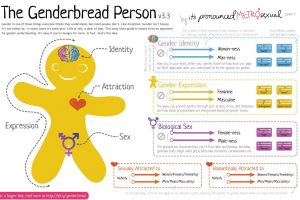Not everything is binary: My experiences as a genderqueer transgender at Leiden University
The recent attention towards discrimination and institutional racism opened a discussion where I think all different kinds of minority voices can and should be heard. I am grateful to take a little bit of space in this discussion and I hope anyone who feels the need to speak up will do so.
As a student before, and as a teacher now, I struggle with ignorance about my gender identity. Within Leiden University I never experienced intentional discrimination, but I did experience a strong feeling of exclusion or unintentional discrimination that was mostly caused by ignorance. In this blog I will share my experiences as a student, the time after graduating when I was looking for a job, and as a teacher at the Institute of Public Administration. It is not my goal to blame anyone but to give some insight in my experiences as a gender neutral, genderqueer, non-binary transgender studying and teaching at Leiden University.
To avoid any confusion, I will explain my gender identity using the gender bread person. I identify as genderqueer which means that I consider myself in between male and female, or as not having a specific gender. My gender expression (which refers to actions, how you dress, and demeanor) in an ideal world would be gender neutral but in daily life I have a more masculine gender expression at work and a more feminine/neutral expression outside work. My biological sex assigned at birth was female, but my biological sex now is, with some help from the hospital, also in between male and female.


Student
The main thing I noticed as a student was the rampant gender binary. Not only my university but society as a whole is imbued with a strict distinction between male and female. The result is that other genders are ignored and/or excluded.
In a qualitative methods course, types of data and measurement like nominal, ordinal, interval, and ratio scales were explained. As an example, for nominal scale gender was used. What is your gender? Male or female? As if any other gender didn’t exist at all. I didn’t dare to say anything about it at the time because I didn’t really figure out my own gender identity yet. This was far before I even applied for the waiting list for a transition trajectory at the hospital.
I noticed the same in research and discussions about gender inequality in public administration. Discussions were mainly focused on the inequality between men and women. Glass ceilings, few women in higher management positions, positive discrimination, etc. But nothing on other genders. Again, people like me didn’t seem to exist in these discussions.
As a student in public administration I was also disappointed that the government didn’t seem to acknowledge any other genders than male and female. On passports, ID cards and other official documents the only options were male and female. In July 2020, the government announced that around 2024/2025 gender markers on ID cards will not be mandatory anymore. This left me with mixed feelings. At least I don’t have to choose between male and female on my ID card any longer but since there is also not a third option, they don’t really seem to acknowledge my gender identity. Unfortunately, gender markers are still mandatory on passports because of some European law.
At first sight these might seem like relatively small, maybe even irrelevant, points. I don’t believe the people who were involved on purpose tried to exclude other genders. Nevertheless, as a result I felt like I didn’t exist, I was invisible, or at best my existence was not worth mentioning. The feeling of exclusion increased my gender dysphoria: I felt disgusted about my own body and voice. I tried to avoid presentations, asking questions in class, and drawing attention to myself as much as possible.
Jobhunting
After my graduation I started looking for a job. Around the same time, I started my transitioning process at the hospital. My worst fear about transitioning was that I couldn’t get a job, even with two master degrees. The unemployment rate among transgenders was 60% and the income of transgenders was significantly lower than others in the labor force. My fears were not unfounded. I worked as cleaner for a while to be able to pay the rent. Not to offend any cleaners but this was not the job I wanted or hoped for. I responded to hundreds of job vacancies, in my field, outside my field, below my paygrade, above my paygrade and everything in between. Job interviews were the worst. I could see the confusion, and sometimes even aversion, on people’s faces. Even if they asked basic interview questions about what I expected from the job or what I was looking for in a job, I had the feeling they didn’t take it very seriously and/or felt uncomfortable. During some interviews I never got to talk about content or requirements of the job. As a result, I became more and more insecure. Even with job interviews that were quite normal I was so nervous I wasn’t able anymore to present myself properly. After 1.5 years, hundreds of letters and numerous job interviews, I ran into my thesis supervisor at a conference. He said public administration had vacancies for teachers. I didn’t get the job. I was too nervous during the interview, and I wouldn’t have hired myself either to be honest. But they asked if I could do some grading support, so I did.
Teaching
After a while I became a teacher, which I still enjoy a lot. As a teacher I felt less vulnerable although I’m always on my guard with new students. There is still a lot of (physical and verbal) violence against transgenders. Unfortunately, I’m no exception. You never know if anyone will react negatively.
Most students don’t ask about my gender. Usually new students are a bit confused but as soon as one of them has said sir or madam they all stick with it. I don’t really care how they call me, he/she or the more neutral they/them. For me using sir or madam is just some unnecessary way to show politeness or respect. In the end in my opinion politeness or respect has nothing to do with how you call people but with how you treat people. On the one hand I don’t want people to feel uncomfortable about how they call me, on the other hand I also don’t want to explain it every time I meet a new person.
What still bugs me within (but also outside) the academic world is that people treat you differently depending on how they perceive you. This is not always clear and out in the open but more visible in informal social interactions. When people perceive you as male they tend to question or second guess what you say to a lesser extent. A hard no is a hard no in most cases. When my gender expression is more feminine my experience is that people more often question what you say or that they try to test if the limits you indicate are really the limits. A hard no is still up for negotiation or needs to be defended for some reason. Besides the fact that gender neutral office wear doesn’t exist I decided to wear male office wear to work. Firstly, because people will take you more seriously, and secondly, because it is safer to present yourself clearly and consistently as either male or female. I wish I felt confident and safe enough to wear whatever I want.
Improvements
Despite my negative experiences I want to compliment my colleagues at the institute of public administration because I feel safe among them. Obviously, a lot has improved over the years, but I want to end this blog by pointing out three improvements that can be made by the university administration and the academic community.
First, either remove any unnecessary gender reference from official documents (application forms for students/new employees/conferences, surveys, research reports, advertisements for research grants, etc.), or provide a third option like ‘other gender/third gender’.
Second, if you do a job interview communicate very clearly to every applicant that (1) you value a safe workplace, (2) that discrimination or exclusive behavior is not tolerated, and (3) that if shit hits the fan the university will have your back.
Third, reflect and reconsider. Ask yourself and the people around you what is considered normal or what a safe environment means to you. You might notice that it’s not the same for everybody. It’s always good to inform yourself on what is normal and safe for minority groups and what negative experiences they might have but also be aware that it’s different for every individual. Someone that might have exactly the same gender identity as me can have totally different experiences and preferences. What is offensive or hurtful to one person can be no big deal to another person. Don’t make assumptions but just talk to the people around you. Making assumptions is most dangerous because it might seem for most people that everything is all right and safe while for others it’s not. If you assume everything is all right there is no need to discuss problems. The problem of unintentional exclusion or discrimination out of ignorance can be solved for a big part if everybody puts a little bit of effort in talking to each other.
About Margot Kersing
I’m Margot Kersing, 32, living in Rotterdam. I hold a bachelor’s and master’s degree in Public Administration and a master’s degree in Political Philosophy (Leiden University). I worked as a teacher at the Institute of Public Administration at Leiden University from 2016 till 2018. After a year working at the University of Amsterdam and The Hague University of Applied Sciences I started working again as a teacher at the Institute of Public Administration at Leiden University. My academic interests include responsibility/accountability, street-level bureaucracy, digitalization in the public sector, philosophy of social sciences, ethics, and political philosophy. In my free time I enjoy playing the violin and cuddling my cat.



0 Comments